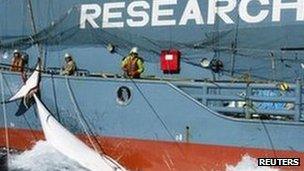Australia sends plane to monitor Japanese whaling
- Published

Japan caught more than 100 whales in the Southern Ocean last year for what it calls scientific research
Australia says it will send a surveillance plane to the Southern Ocean to monitor Japanese whaling ships.
The government hopes the aircraft will help prevent conflict between the whalers and environmentalists.
But a campaign group says officials should be sending ships to stop - not monitor - the annual whale catch.
The International Court of Justice is due to rule next year on an Australian claim that Japanese whaling is illegal.
Japanese vessels are already on their way to the seas around the Antarctic for their annual hunt for whales, a period that last between January and March.
The environmental group Sea Shepherd Australia has despatched three vessels to try to prevent the Japanese catching whales.
Scientific research?
To hamper the Japanese, campaigners use tactics such as sailing small boats in between harpoons and the whales they are targeting.
Australian Environment Minister Greg Hunt announced the government would be sending an aircraft, not a boat, to try to stop confrontations.
"The purpose of the customs mission will be to record the incidents on the high seas," he said.
"It will be to ensure there is a presence to make sure there is no conflict between the parties."
But the Sea Shepherd group reacted angrily to the news, saying the current administration had gone back on a promise to send ships to stop the whaling.
"They haven't got the guts to go down there and do it," Jeff Hansen, managing director of Sea Shepherd Australia, told the BBC.
There is a worldwide ban on hunting whales, apart for those used for scientific research. Japanese vessels used this provision last year to catch 103 minke whales in the Southern Ocean.
But the Australian government believes Japan is, in effect, engaged in commercial whaling and has taken its case to the United Nation's International Court of Justice, based in The Hague.
Japan contests that claim and the court is expected to give its ruling in the next few months.
- Published12 April 2013
- Published1 March 2013
- Published27 February 2013
- Published20 February 2013
- Published9 March 2012
- Published19 December 2012
- Published1 February 2013